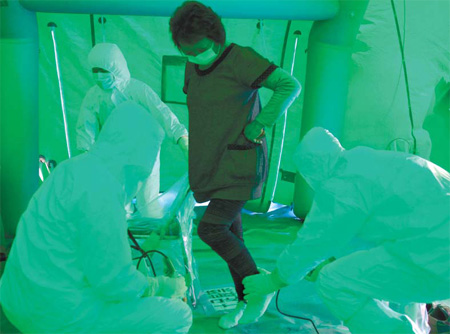Global Reaction
Japan's neighbors monitor shipments
(China Daily)
Updated: 2011-03-17 08:46
 |
Large Medium Small |
|
 Medical staff use a Geiger counter to screen a woman for possible radiation exposure at a public welfare center in Hitachi City, Ibaraki, on Wednesday, after she was evacuated from an area within a 20 km radius of the Fukushima Daiichi nuclear plant. [Photo/Agencies]
|
BEIJING / TOKYO - Japan's neighbors have ordered strengthened radiation monitoring of shipments from Japan, but said they don't foresee their countries having any immediate effects of contamination from the Japanese nuclear crisis.
|
||||
Besides China, far eastern Russia and the Korean Peninsula are Japan's closest neighbors.
The Russian Emergencies Ministry said on Tuesday it detected no increase in radiation levels.
South Korean officials said they had strengthened radiation monitoring. Officials began to inspect all livestock and fisheries products imported from Japan for radiation contamination on Monday, according to the Ministry for Food, Agriculture, Forestry and Fisheries. In the past, only random samples were inspected.
About 50 tons of animal products have been tested so far but no contamination has been found, said ministry official Jang Jae-hong.
The state-run Korea Food & Drug Administration has also started radiation checks, agency official Oh Geum-sun said.
Two-way trade between South Korea and Japan reached about $92.5 billion last year, with Japan ranked as South Korea's second-largest trading partner after China.
China's Taiwan region, which is southwest of Japan, has begun checking food imports from the Fukushima area of Japan for radiation contamination, and airport officials are offering to scan any inbound passengers from Japan who are worried about radiation.
Fukushima in northeastern Japan, 220 km north of Tokyo, is where Japanese officials are frantically struggling to contain radiation from a nuclear plant crippled by the earthquake and tsunami.
Further away, Singapore said it has increased inspections of food imports from Japan.
In Tokyo, foreign bankers are fleeing as the nuclear crisis worsens, scrambling for commercial and charter flights out of the country and into other major cities in the region.
BNP Paribas, Standard Chartered and Morgan Stanley were among the banks whose staff members have left, according to industry sources with direct knowledge of the matter.
Expatriate staff at most foreign banks in Tokyo make up a small portion of the total, by some estimates less than 10 percent. But many are often in senior positions so their departure can have a significant impact.
And while Japan's investment banking market is famously tough, it is an essential place for large banks to be and can produce hefty fees.
"The foreign banker presence on the ground in Tokyo now is very thin and depending on how long it takes them to return there could be lasting implications of that," said one banker. "Every time there's a washout of foreigners in Japan they never quite return in the same numbers."
AP-Reuters
| 分享按钮 |



